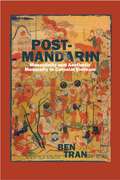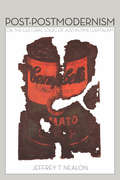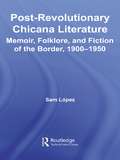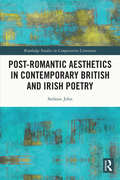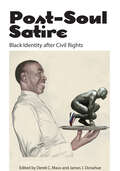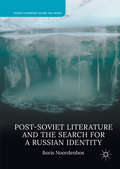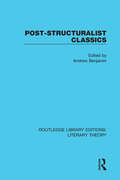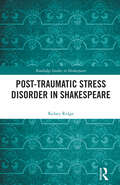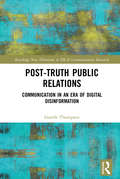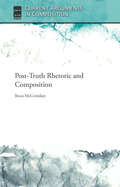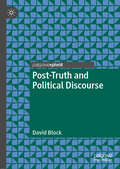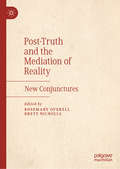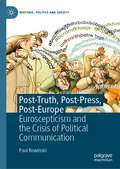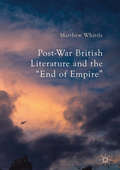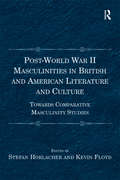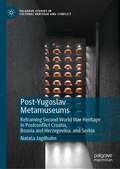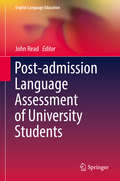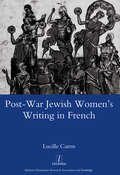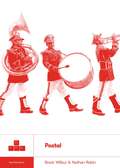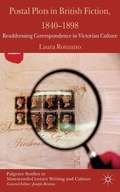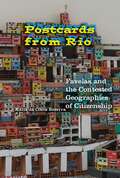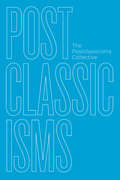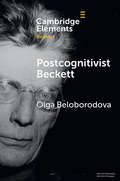- Table View
- List View
Post-Mandarin: Masculinity and Aesthetic Modernity in Colonial Vietnam (Fordham University Press Ser.)
by Ben TranPost-Mandarin offers an engaging look at a cohort of Vietnamese intellectuals who adopted European fields of knowledge, a new Romanized alphabet, and print media—all of which were foreign and illegible to their fathers. This new generation of intellectuals established Vietnam’s modern anticolonial literature.The term “post-mandarin” illuminates how Vietnam’s deracinated figures of intellectual authority adapted to a literary field moving away from a male-to-male literary address toward print culture. With this shift, post-mandarin intellectuals increasingly wrote for and about women.Post-Mandarin illustrates the significance of the inclusion of modern women in the world of letters: a more democratic system of aesthetic and political representation that gave rise to anticolonial nationalism. This conceptualization of the “post-mandarin” promises to have a significant impact on the fields of literary theory, postcolonial studies, East Asian and Southeast Asian studies, and modernist studies.
Post-Postmodernism, or, The Cultural Logic Of Just-In-Time Capitalism
by Jeffrey T. NealonPost-Postmodernism begins with a simple premise: we no longer live in the world of "postmodernism," famously dubbed "the cultural logic of late capitalism" by Fredric Jameson in 1984. Far from charting any simple move "beyond" postmodernism since the 1980s, though, this book argues that we've experienced an intensification of postmodern capitalism over the past decades, an increasing saturation of the economic sphere into formerly independent segments of everyday cultural life. If "fragmentation" was the preferred watchword of postmodern America, "intensification" is the dominant cultural logic of our contemporary era. Post-Postmodernism surveys a wide variety of cultural texts in pursuing its analyses—everything from the classic rock of Black Sabbath to the post-Marxism of Antonio Negri, from considerations of the corporate university to the fare at the cineplex, from reading experimental literature to gambling in Las Vegas, from Badiou to the undergraduate classroom. Insofar as cultural realms of all kinds have increasingly been overcoded by the languages and practices of economics, Nealon aims to construct a genealogy of the American present, and to build a vocabulary for understanding the relations between economic production and cultural production today—when American-style capitalism, despite its recent battering, seems nowhere near the point of obsolescence. Post-postmodern capitalism is seldom late but always just in time. As such, it requires an updated conceptual vocabulary for diagnosing and responding to our changed situation.
Post-Revolutionary Chicana Literature: Memoir, Folklore and Fiction of the Border, 1900–1950 (Latino Communities: Emerging Voices - Political, Social, Cultural and Legal Issues)
by Sam LopezThis book examines how Chicana literature in three genres—memoir, folklore, and fiction—arose at the turn of the twentieth century in the borderlands of the United States and Mexico. Lopez examines three women writers and highlights their contributions to Chicana writing in its earliest years as well as their contributions to the genres in which they wrote. The women -- Leonor Villegas de Magnón, Jovita Idar, and Josefina Niggli—represent three powerful voices from which to gain a clearer understanding of women’s lives and struggles during and after the Mexican Revolution and also, offer surprising insights into women’s active roles in border life and the revolution itself. Readers are encouraged to rethink Chicana lives, and expand their ideas of "Chicana" from a subset of the Chicano Movement of the 1960s to a vibrant and vigorous reality stretching back into the past.
Post-Romantic Aesthetics in Contemporary British and Irish Poetry (Routledge Studies in Comparative Literature)
by Stefanie JohnThis book demonstrates the legacies of Romanticism which animate the poetry and poetics of Eavan Boland, Gillian Clarke, John Burnside, and Kathleen Jamie. It argues that the English Romantic tradition serves as a source of inspiration and critical contention for these Irish, Welsh, and Scottish poets, and it relates this engagement to wider concerns with gender, nation, and nature which have shaped contemporary poetry in Britain and Ireland. Covering a substantial number of works from the 1980s to the 2010s, the book discusses how Boland and Clarke, as women poets from the Republic of Ireland and Wales, react to a male-dominated and Anglocentric lyric tradition and thus rework notions of the Romantic. It examines how Burnside and Jamie challenge, adopt, and revise Romantic aesthetics of nature and environment. The book is the first in-depth study to read Boland, Clarke, Burnside, and Jamie as post-Romantics. By disentangling the aesthetic and critical conceptions of Romanticism which inform their inheritance, it develops an innovative approach to the understanding of contemporary poetry and literary influence.
Post-Soul Satire: Black Identity after Civil Rights
by James J. Donahue Derek C. MausFrom 30 Americans to Angry White Boy, from Bamboozled to The Boondocks, from Chappelle's Show to The Colored Museum, this collection of twenty-one essays takes an interdisciplinary look at the flowering of satire and its influence in defining new roles in black identity. As a mode of expression for a generation of writers, comedians, cartoonists, musicians, filmmakers, and visual/conceptual artists, satire enables collective questioning of many of the fundamental presumptions about black identity in the wake of the civil rights movement. Whether taking place in popular and controversial television shows, in a provocative series of short internet films, in prize-winning novels and plays, in comic strips, or in conceptual hip-hop albums, this satirical impulse has found a receptive audience both within and outside the black community. Such works have been variously called “post-black,” “post-soul,” and examples of a “New Black Aesthetic.” Whatever the label, this collection bears witness to a noteworthy shift regarding the ways in which African American satirists feel constrained by conventional obligations when treating issues of racial identity, historical memory, and material representation of blackness. Among the artists examined in this collection are Paul Beatty, Dave Chappelle, Trey Ellis, Percival Everett, Donald Glover (a.k.a. Childish Gambino), Spike Lee, Aaron McGruder, Lynn Nottage, ZZ Packer, Suzan Lori-Parks, Mickalene Thomas, Touré, Kara Walker, and George C. Wolfe. The essays intentionally seek out interconnections among various forms of artistic expression. Contributors look at the ways in which contemporary African American satire engages in a broad ranging critique that exposes fraudulent, outdated, absurd, or otherwise damaging mindsets and behaviors both within and outside the African American community.
Post-Soviet Literature and the Search for a Russian Identity
by Boris NoordenbosThis book examines a wide range of contemporary Russian writers whose work, after the demise of Communism, became more authoritative in debates on Russia's character, destiny, and place in the world. Unique in his in-depth analysis of both playful postmodernist authors and fanatical nationalist writers, Noordenbos pays attention to not only the acute social and political implications of contemporary Russian literature but also literary form by documenting the decline of postmodern styles, analyzing shifting metaphors for a "Russian identity crisis," and tracing the emergence of new forms of authorial ethos. To achieve this end, the book builds on theories of postcoloniality, trauma, and conspiracy thinking, and makes these research fields productively available for post-Soviet studies.
Post-Structuralist Classics (Routledge Library Editions: Literary Theory #5)
by Andrew BenjaminModern literary theory is increasingly looking to philosophy for its inspiration. After a wave of structural analysis, the growing influence of deconstruction and hermeneutic readings continues to bear witness to this. This exciting and important collection, first published in 1988, reveals the diversity of approaches that mark the post-structuralist endeavour, and provides a challenge to the conventional practice of classical studies and ancient philosophy. This book will be of interest to students of ancient philosophy, classical studies and literary theory.
Post-Structuralist Classics (Routledge Library Editions: Literary Theory)
by Andrew BenjaminModern literary theory is increasingly looking to philosophy for its inspiration. After a wave of structural analysis, the growing influence of deconstruction and hermeneutic readings continues to bear witness to this. This exciting and important collection, first published in 1988, reveals the diversity of approaches that mark the post-structuralist endeavour, and provides a challenge to the conventional practice of classical studies and ancient philosophy. This book will be of interest to students of ancient philosophy, classical studies and literary theory.
Post-Traumatic Stress Disorder in Shakespeare (Routledge Studies in Shakespeare)
by Kelsey RidgePost-Traumatic Stress Disorder in Shakespeare combines literary criticism, performance studies, psychiatric literature, trauma studies, and disability studies to examine the presentation of PTSD in Shakespeare’s plays. This volume takes as case studies 1 Henry IV, Othello, Macbeth, Much Ado About Nothing, and Troilus and Cressida. This character-based, interdisciplinary approach places Shakespeare’s texts and their production histories in conversation with current scientific research by blending literary analysis, medical and psychosocial research, memoirs and patient accounts, and performance history. This research deepens our understanding of representations of trauma in early modern literature and reveals what the artistic representations of trauma and PTSD in the early modern period can tell us about the history of this condition. It reminds us that people lived with PTSD long before the APA codified the condition in the 1980s; it places this condition in a longer historical continuity. With this knowledge, we can better consider the role Shakespeare can play in how we respond to trauma and psychological injury now.
Post-Truth Public Relations: Communication in an Era of Digital Disinformation (Routledge New Directions in PR & Communication Research)
by Gareth ThompsonThis book explores the purpose, practice and effects of public relations (PR) at a time that has been variously described as an era of populism, post-truth and fake news. It considers how PR processes have contributed to the current social condition of post-truth and what constitutes PR work in this environment. Post-Truth Public Relations: Communication in an Era of Digital Disinformation proposes that while we can now look back upon the last 80–100 years as a period of classical PR, that style is being supplemented by the emergence of a post-classical form of PR that has emerged in response to the post-truth era. This new style of PR consists of a mixed repertoire of communicative work that matches the new geometry of digital media and delivers a mix of online engagement and persuasion in order to meet the needs of increasingly partisan audiences. Using contemporary case studies and original interviews with PR practitioners in several countries, including China and the Philippines, the book investigates how PR workers have reconciled their role as communicative intermediaries with the post-truth era of digital disinformation. This thought-provoking book will be of great interest to researchers and advanced students interested in the changing nature of PR and its practice.
Post-Truth Rhetoric and Composition
by Bruce MccomiskeyPost-Truth Rhetoric and Composition is a timely exploration of the increasingly widespread and disturbing effect of “post-truth” on public discourse in the United States. Bruce McComiskey analyzes the instances of bullshit, fake news, feigned ethos, hyperbole, and other forms of post-truth rhetoric employed in recent political discourse. The book frames “post-truth” within rhetorical theory, referring to the classic triad of logos, ethos, and pathos. McComiskey shows that it is the loss of grounding in logos that exposes us to the dangers of post-truth. As logos is the realm of fact, logic, truth, and valid reasoning, Western society faces increased risks—including violence, unchecked libel, and tainted elections—when the value of reason is diminished and audiences allow themselves to be swayed by pathos and ethos. Evaluations of truth are deferred or avoided, and mendacity convincingly masquerades as a valid form of argument. In a post-truth world, where neither truth nor falsehood has reliable meaning, language becomes purely strategic, without reference to anything other than itself. This scenario has serious consequences not only for our public discourse but also for the study of composition.
Post-Truth and Political Discourse
by David BlockIn this book David Block draws on analytical techniques from Critical Discourse Studies to critically investigate truth, truths, the propagation of ignorance and post-truth. Focusing on corrupt discourses and agnotology, he explores the role of anti-intellectualism, emotion and social media in the cultural creation, legitimisation and dissemination of ignorance. While encompassing analysis of discourses on Donald Trump, Brexit, climate change and the Alt-Right, Block furthers our understanding of this global phenomena by providing a revealing analysis of political communications relating to corruption scandals involving the Spanish conservative party. Through an innovative theoretical framework that combines critical discourse and discourse historical approaches with nuanced political analysis, he uncovers the rhetorical means by which esoteric truths and misleading narratives about corruption are created and demonstrates how they become, in their turn, corrupt discourses. This original work offers fresh insights for scholars of Discourse Analysis, Sociolinguistics, Politics, Cultural and Communication Studies, and will also appeal to general readers with an interest in political communication and Spanish politics.
Post-Truth and Political Discourse
by David BlockIn this book David Block draws on analytical techniques from Critical Discourse Studies to critically investigate truth, truths, the propagation of ignorance and post-truth. Focusing on corrupt discourses and agnotology, he explores the role of anti-intellectualism, emotion and social media in the cultural creation, legitimisation and dissemination of ignorance. While encompassing analysis of discourses on Donald Trump, Brexit, climate change and the Alt-Right, Block furthers our understanding of this global phenomena by providing a revealing analysis of political communications relating to corruption scandals involving the Spanish conservative party. Through an innovative theoretical framework that combines critical discourse and discourse historical approaches with nuanced political analysis, he uncovers the rhetorical means by which esoteric truths and misleading narratives about corruption are created and demonstrates how they become, in their turn, corrupt discourses. This original work offers fresh insights for scholars of Discourse Analysis, Sociolinguistics, Politics, Cultural and Communication Studies, and will also appeal to general readers with an interest in political communication and Spanish politics.
Post-Truth and the Mediation of Reality: New Conjunctures
by Rosemary Overell Brett NichollsOur contemporary moment is preoccupied with arbitrating ‘reality’. With the spectre of buzzwords like ‘fake news’ and ‘post-truth’ we find a scramble to locate or fix some sort of universal ‘real’ beneath what are positioned as ‘fake’ articulations. To engage with this crisis, this collection argues for the importance of a new conjuncture in communication and cultural studies of media. Building on Hall’s understanding of ‘conjuncture’ as a way of grasping moments within hegemonic struggle, the essays suggest that the current moment requires a revitalization of the concept of conjuncture.
Post-Truth, Post-Press, Post-Europe: Euroscepticism and the Crisis of Political Communication (Rhetoric, Politics and Society)
by Paul RowinskiThis book explores whether a beleaguered press in recent years has been developing an emotive, Eurosceptic post-truth rhetoric of its own – competing for attention with populist politicians. These politicians now by-pass the media, talking directly to their publics in blogs, on Twitter and Facebook. In the post-truth age, objective facts are less influential in shaping opinion than appeals to emotion. Audiences congregate around views they share and want to believe. The author presents a critical discourse analysis of the language used by populist politicians online, on Facebook, and subsequently quoted in the press, which highlights how the political rhetoric of Italian and British politicians is often at its most inflammatory around the issue of immigration. The same goes for the press. The Italian case study focuses on media coverage of the 2014 and 2019 European elections and 2018 general election. The British case study examines press reporting of the 2016 UK referendum on EU membership, the 2017 general election, and the September 2019 parliamentary debate immediately following the UK Supreme Court ruling that proroguing of Parliament was illegal. From the picture that emerges, the author argues that journalists need to change how they report, to challenge the post-truthers, holding them to account and pressing them on the facts while also harnessing the emotions of disaffected publics.
Post-War British Literature and the "End of Empire"
by Matthew WhittleThis book examines literary texts by British colonial servant and settler writers, including Anthony Burgess, Graham Greene, William Golding, and Alan Sillitoe, who depicted the impact of decolonization in the newly independent colonies and at home in Britain. The end of the British Empire was one of the most significant and transformative events in twentieth-century history, marking the beginning of a new world order and having an indelible impact on British culture and society. Literary responses to this moment by those from within Britain offer an enlightening (and often overlooked) exploration of the influence of decolonization on received notions of "race" and class, while also prefiguring conceptions of multiculturalism. As Matthew Whittle argues in this sweeping study, these works not only view decolonization within its global context (alongside the aftermath of the Second World War, the rise of America, and mass immigration) but often propose a solution to imperial decline through cultural renewal.
Post-World War II Masculinities in British and American Literature and Culture: Towards Comparative Masculinity Studies
by Stefan Horlacher Kevin FloydAnalyzing literary texts, plays, films and photographs within a transatlantic framework, this volume explores the inseparable and mutually influential relationship between different forms of national identity in Great Britain and the United States and the construction of masculinity in each country. The contributors take up issues related to how certain kinds of nationally specific masculine identifications are produced, how these change over time, and how literature and other forms of cultural representation eventually question and deconstruct their own myths of masculinity. Focusing on the period from the end of World War II to the 1980s, the essays each take up a topic with particular cultural and historical resonance, whether it is hypermasculinity in early cold war films; the articulation of male anxieties in plays by Arthur Miller, David Mamet and Sam Shepard; the evolution of photographic depictions of masculinity from the 1960s to the 1980s; or the representations of masculinity in the fiction of American and British writers such as Patricia Highsmith, Richard Yates, John Braine, Martin Amis, Evan S. Connell, James Dickey, John Berger, Philip Roth, Frank Chin, and Maxine Hong Kingston. The editors and contributors make a case for the importance of understanding the larger context for the emergence of more pluralistic, culturally differentiated and ultimately transnational masculinities, arguing that it is possible to conceptualize and emphasize difference and commonality simultaneously.
Post-Yugoslav Metamuseums: Reframing Second World War Heritage in Postconflict Croatia, Bosnia and Herzegovina, and Serbia (Palgrave Studies in Cultural Heritage and Conflict)
by Nataša JagdhuhnThis book analyzes how Second World War heritage is being reframed in the memorial museums of the post-socialist, post-conflict states of Croatia, Bosnia and Herzegovina, and Serbia. It argues that in all three countries, a reluctance to confront undesirable parts of their national histories is the root cause explaining why the state-funded Second World War memorial museums remain stuck in the postsocialist transition. In most cases, Second World War museums, exhibitions, and displays conceived in the Yugoslav period have been left unchanged. However, there are also examples where new sections were added to the old ones and there are a small number of completely reconceptualized permanent exhibitions. The transitional position of the Second World War museums has made it possible to view these institutions as historical formations in their own right. The book will appeal to students and academics working in the fields of heritage and museums studies, memory studies, and cultural history of Southeast-Europe.
Post-admission Language Assessment of University Students
by John ReadEnglish-medium universities around the world face real challenges in ensuring that incoming students have the language and literacy skills they need to cope with the demands of their degree programmes. One response has been a variety of institutional initiatives to assess students after admission, in order to identify those with significant needs and advise them on how to enhance their academic language ability. This volume brings together papers from Australia, Canada, Hong Kong, New Zealand, Oman, South Africa and the United States, written by language assessment specialists who discuss issues in the design and implementation of these post-admission assessments in their own institutions. A major theme running through the book is the need to evaluate the validity of such assessments not just on their technical quality but on their impact, in terms of giving students access to effective means of developing their language skills and ultimately enhancing their academic achievement.
Post-war Jewish Women's Writing in French: Juives Francaises Ou Francaises Juives?
by Lucille Cairns"How have French Jewish women reacted to the great traumas of the last century - the Holocaust, North African decolonization and the resulting migration of African Jews to France, the Arab-Israeli crisis and the aftermath of 9/11? Cairns's major new volume identifies the themes of books by French Jewish women from 1945 to the present day, gauging to what extent they are dominated by, informed by, or relatively indifferent to these threatening events. Thirty authors in particular serve as representatives of a great, and greatly diverse, pool: divided not only as Ashkenazim or Sephardim, but by origins scattered across Algeria, Egypt, Germany, Hungary, Morocco, Poland, Romania, Russia, Tunisia, and Turkey. Theirs is a transnational, doubly-diasporic, and thus particularly complex paradigm in which feminism, loyalty to family culture and to the traditions of Judaism often exists in tension with French Republican models of assimilation, non-differentiation, and gender-blindness. Lucille Cairns is Professor of French Literature at the University of Durham."
Postal (Boss Fight Books)
by Nathan Rabin Brock WilburJust as the video game console market was about to crash into the New Mexico desert in 1983, professor and sociologist David Sudnow was unearthing the secrets of &“eye, mind, and the essence of video skill&” through an exploration of Atari&’s Breakout, one of the earliest hits of the arcade world. Originally released under the title Pilgrim in the Microworld, Sudnow&’s groundbreaking longform criticism of a single game predates the rise of game studies by decades. While its earliest critics often scorned the idea of a serious book about an object of play, the book&’s modern readers remain fascinated by an obsessive, brilliant, and often hilarious quest to learn to play Breakout just as one would learn the piano. Featuring a new foreword and freshly edited text, Breakout makes a perfect addition to Boss Fight&’s lineup of critical, historical, and personal looks at single video games. We&’re proud to restore this classic to print and share with new audiences Sudnow&’s wild pilgrimage into the limitless microworld of play.
Postal Plots in British Fiction, 1840–1898
by Laura RotunnoBy 1840, the epistolary novel was dead. Letters in Victorian fiction, however, were unmistakably alive. Postal Plots explores how Victorian postal reforms unleashed a new and sometimes unruly population into the Victorian literary marketplace where they threatened the definition and development of the Victorian literary professional.
Postcards from Rio: Favelas and the Contested Geographies of Citizenship
by Kátia da BezerraThrough the analysis of a variety of favela-based visual cultural productions by young people and contemporary theorists, Postcards from Rio examines the complex relationship between citizenship and urban space in contemporary Rio de Janeiro.By analyzing videos and photographs, Kátia da Costa Bezerra illustrates how citizens of favelas are reshaping their sense of belonging as subjects and as a legitimate part of the city. A groundbreaking study that examines more deeply the relationship between urban space, citizenship, and imagery originating in the favelas, Postcards from Rio sheds crucial light on how contemporary lenses are defining and mediating the meanings of space and citizenship as strategies of empowerment. The city emerges as a political space where multiplicities of perspectives are intertwined with demands for more inclusive forms of governance.
Postclassicisms: The Postclassicisms Collective
by The Postclassicisms CollectiveMade up of nine prominent scholars, The Postclassicisms Collective aims to map a space for theorizing and reflecting on the values attributed to antiquity. The product of these reflections, Postclassicisms takes up a set of questions about what it means to know and care about Greco-Roman antiquity in our turbulent world and offers suggestions for a discipline in transformation, as new communities are being built around the study of the ancient Greco-Roman world. Structured around three primary concepts—value, time, and responsibility—and nine additional concepts, Postclassicisms asks scholars to reflect upon why they choose to work in classics, to examine how proximity to and distance from antiquity has been—and continues to be—figured, and to consider what they seek to accomplish within their own scholarly practices. Together, the authors argue that a stronger critical self-awareness, an enhanced sense of the intellectual history of the methods of classics, and a greater understanding of the ethical and political implications of the decisions that the discipline makes will lead to a more engaged intellectual life, both for classicists and, ultimately, for society. A timely intervention into the present and future of the discipline, Postclassicisms will be required reading for professional classicists and students alike and a model for collaborative disciplinary intervention by scholars in other fields.
Postcognitivist Beckett (Elements in Beckett Studies)
by Olga BeloborodovaThe aim of this Element is to offer a reassessment of Beckett's alleged Cartesianism using the theoretical framework of extended cognition – a cluster of present-day philosophical theories that question the mind's brain-bound nature and see cognition primarily as a process of interaction between the human brain and the environment it operates in. The principal argument defended here is that, despite the Cartesian bias introduced by early Beckett scholarship, Beckett's fictional minds are not isolated 'skullscapes'. Instead, they are grounded in interaction with their fictional storyworlds, however impoverished those may have become in the later part of his writing career.
